
If your hardwood floors need a good cleaning, you may be wondering how to sanitize them. Sanitizing your floors and keeping a regular cleaning routine is essential in preventing the spread of bacteria and keeping your home healthy.
When disinfecting hardwood floors, it is essential to use a cleaning product that won’t damage the finish. The good news is that it is possible to disinfect wood floors without causing any damage, but you will need to use the proper methods and products.
Find out all about the best way to clean wood floors in our comprehensive disinfecting guide.
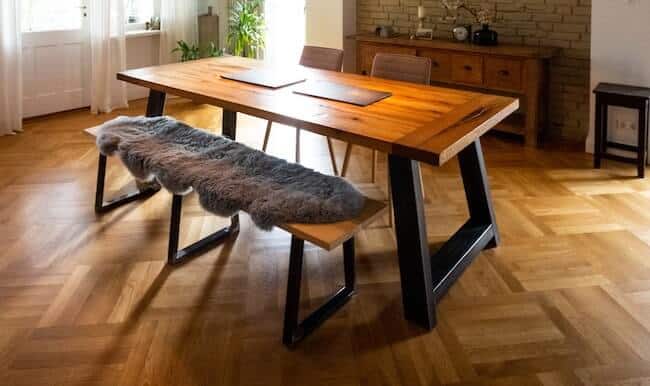
“The key to sanitizing hardwood floors without causing damage involves a delicate balance between hygiene and care. I always recommend using cleaning products specifically designed for hardwood floors, as they will not strip away the protective finish or warp the wood, and ensuring the floor is properly dried afterwards to prevent moisture damage.”
Julius Fairbanks, Wood Technology Specialist
How To Disinfect Wood Floors Guide
The best way to sanitize your wood floors is by using a disinfectant. Use a non-toxic and environmentally-friendly sanitizing solution.
In other words, a dish detergent with too much water won’t do as a floor cleaner since it can damage the wood surface. You see, harsh chemicals found in a cleaning solution could damage the wood floor.
One more tip is to make sure to read the manufacturer’s instructions on the disinfectant to see if it is safe to use on wood floors. Otherwise, you can use a mixture of vinegar and water to disinfect hardwood floors.
Here are a few tips on how to sanitize your wood floor:
- Sweep or vacuum your wood floor regularly to remove dust, pet hair, or loose debris.
- Use a damp mop to clean your wood floor, using hot water and a mild detergent.
- Rinse your wood floor well with clean water and allow it to dry completely.
- Apply a coat of floor sealant to protect your wood floor from dirt, dust, and other debris.
- Let the hardwood floor dry completely before walking on them.
- Repeat the process every few weeks to have clean wood floors that everyone will notice when they visit.
How Do You Disinfect Hardwood Floors Without Damaging Them?
Hardwood floors are a popular choice for homes and businesses, but they require special care to keep them looking their best. One common challenge is how to protect hardwood floors while disinfecting them without causing damage without damaging them.
Here are a few tips for disinfecting hardwood floors without damaging them:
- Use a diluted vinegar solution to disinfect the floor.
- Use a microfiber cloth to clean the floor.
- Avoid using harsh chemicals or products containing ammonia.
- Be careful not to get the floor too wet.
- Dry the floor thoroughly when you are done cleaning them.
There are a few ways to disinfect hardwood floors without damaging them. You can use a steam cleaner, which will kill bacteria and viruses without any chemicals, or a scrubbing hardwood floor cleaner that uses sanitize formula as a cleaning agent.
You can also use vinegar to clean your floors. Mix one part vinegar to two parts warm water, pour it on a clean cloth, wipe the floor, and let it dry. This method works well for both hardwood and vinyl floors.
How Do You Disinfect Hardwood Floors Naturally?
There are a few different ways when it comes to sanitizing hardwood floors, and natural ways may be the best for you, considering the health of your family.
Apple cider vinegar sanitizing
One way to sanitize hardwood floors naturally is by using apple cider vinegar. Remember, apple cider vinegar is a natural sanitizer and floor cleaner that doesn’t damage your health like bleach, for example.
Mix one-part apple cider vinegar with one part water in a bucket to sanitize your floor. Then, use a clean mop to mop your floor with the mixture in small sections.
Baking soda sanitizing
Baking soda is the most popular and effective method of cleaning wood floors. To make it work, you can mix one cup of baking soda with one gallon of water.
Pour the mixture into a spray bottle and spray it. Let the mixture sit for about 15 minutes on the floor surface, and then use a dry mop or a soft cloth to dry it.
Tea tree oil method of sanitizing
Another way to disinfect hardwood floors naturally is by using tea tree oil. Tea tree oil is a natural disinfectant and antiseptic that is effective against various bacteria and viruses.
- Mix 2 tablespoons of tea tree oil with 1 cup of water.
- Mist the floors by using a spray bottle.
- Touch the surface to see if it is dry before walking.
Can I Use Clorox Wipes On Hardwood Floors?
Clorox wipes have always been a popular choice for cleaning because they’re practical and easy to use, but you should take a few precautions.
Firstly, you have to see if the wipes are meant explicitly for hardwood floors. Second, test a small surface and see if they damage the finish. If everything looks good, go ahead and wipe down the entire floor.
How Can I Disinfect My Floors at Home?
One of the fastest to sanitize your floors is to have steam cleaners. They get rid of the bacteria from the shoes, grime and dirt in the corners of the room quickly.
But, you don’t need steam cleaning if you cannot afford it, you can make a vinegar and water mixture. Just be sure to rinse the floors afterwards with clean water and mopping, followed by drying up so that there is no moisture left.
Conclusion
Sanitizing hardwood floors, particularly on areas used the most, such as the floors in exercise rooms, is essential to maintaining health. The importance of it cannot be overlooked because it removes dust and other allergens, sweat and bacteria that may be present.
While there are several different ways to sanitize hardwood floors, the healthiest methods are undoubtedly natural, such as using vinegar, baking soda, and tea tree oil. These methods are not only effective for hardwood but can also be used to deep clean laminate floors.
We hope our sanitizing wood floor guide helped you figure out how to clean hardwood floors without sacrificing the quality of the floor or your health! Remember, if you encounter tougher stains like oil-based paint, we have a guide on removing oil-based paint from hardwood floors as well!

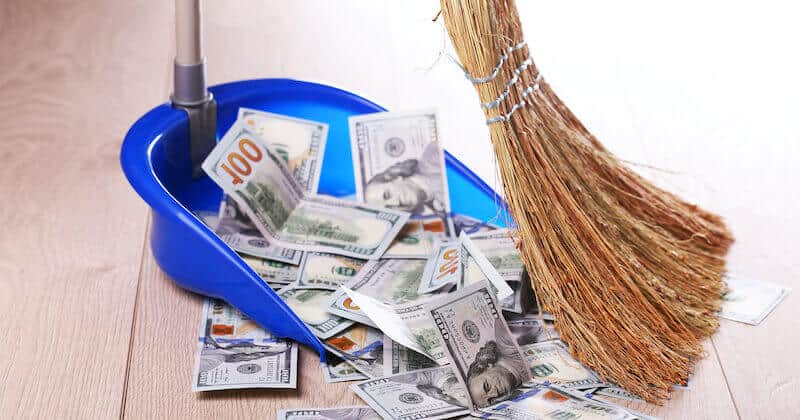
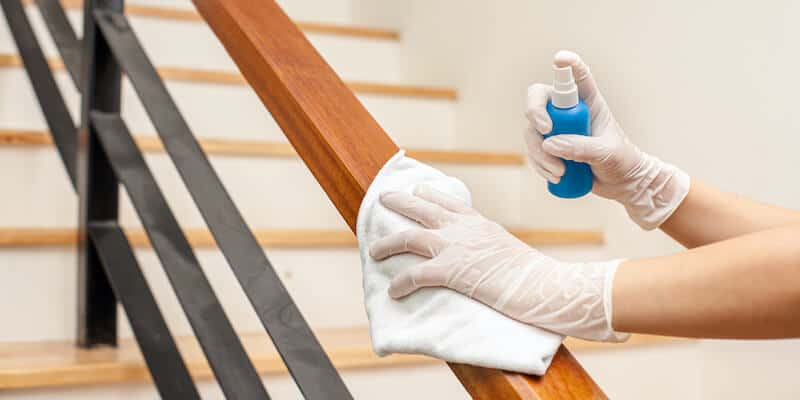
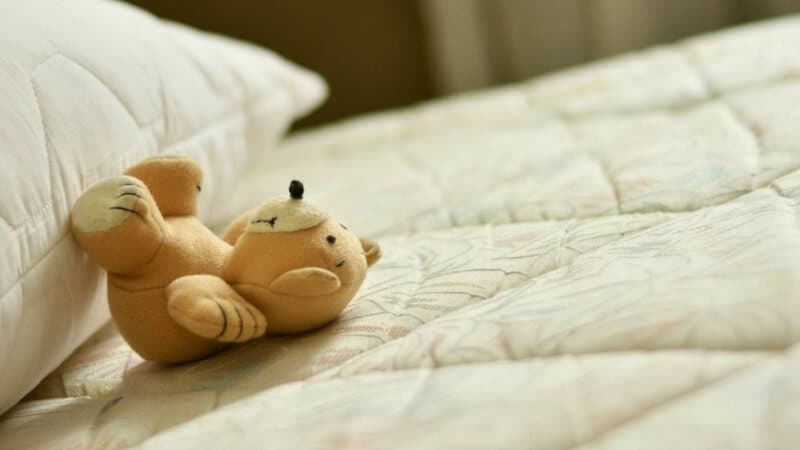
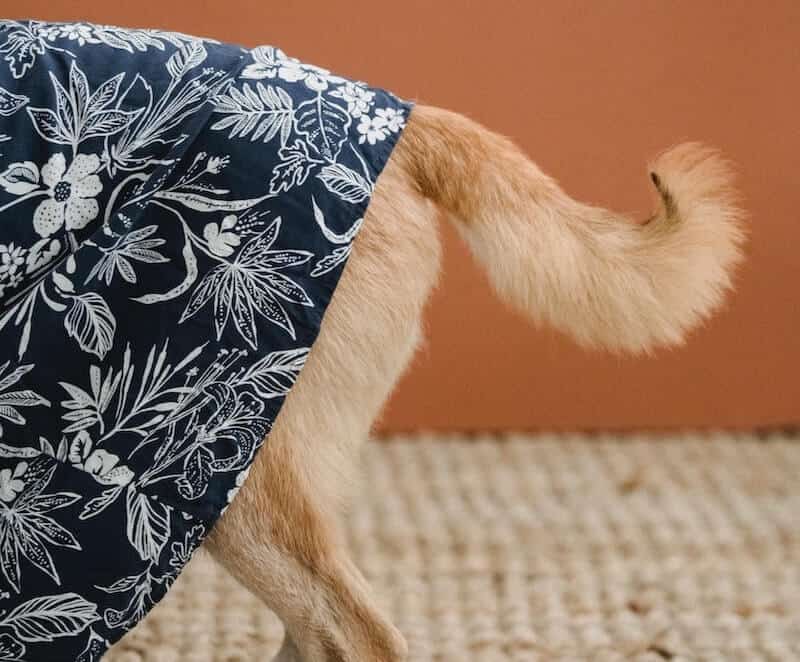
Despite being a professional, I did once make the fatal error of using a harsh chemical on my oak hardwood floor that ruined its finish. Always check the pH balance of your cleaner!
Just like the way I used to recommend to my clients, a mixture of vinegar and water works flawlessly on hardwood floors without causing any damage.
While vinegar and water may work in some cases, I’d personally advise against it for regular use as it can impact the finish over time due to vinegar’s acidic nature.
I agree with you fully, Sloan – using vinegar over a prolonged period can indeed be detrimental to the finish of hardwood floors due to its acidic properties. However, for immediate disinfection, it works quite well as a quick home remedy but it is not advisable as a long-term solution.
Graeme, you’ve hit the nail right on its head. From my own experience, vinegar can indeed be a quick fix for sanitizing wood surfaces, but it’s far from a sustainable solution due to its potential to dull the wood finish over time.
I concur with your point, Griswold. Vinegar can strip the sealant off hardwood floors over time, leaving them more susceptible to damage. However, it’s worth noting that a combination of hot water and mild dish soap provides a safe yet effective cleansing solution for wooden floors without the risk of damaging their natural finish.
I second your thoughts, Hazel. In my experiments, I have also found that a mild solution of dish soap and water works better than any other cleaning formula, without causing any harm to the natural finish of the wood. This homemade cleaner is a viable option when commercially available floor cleaners are out of stock or for those preferring a more eco-friendly alternative.